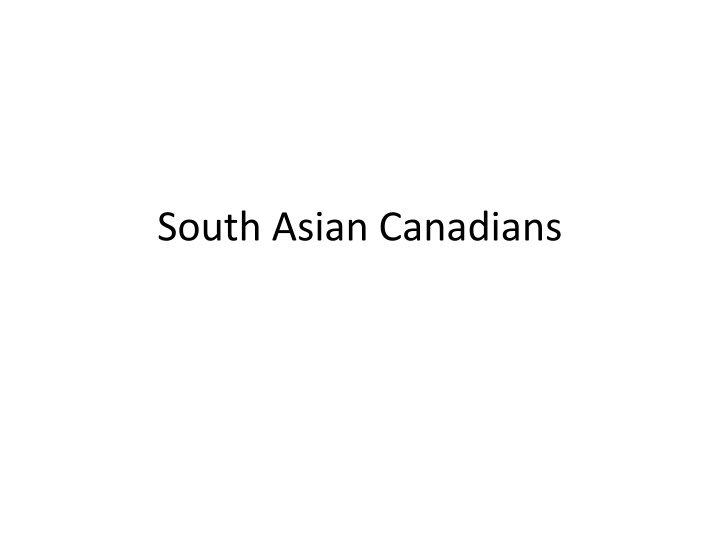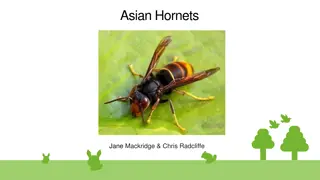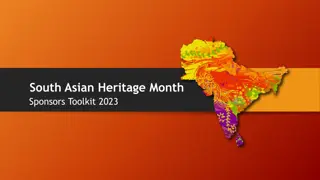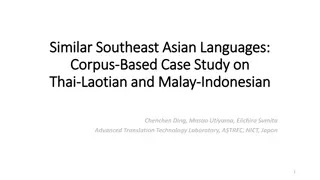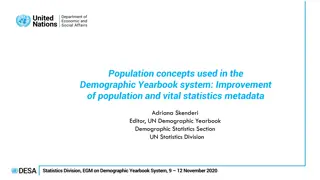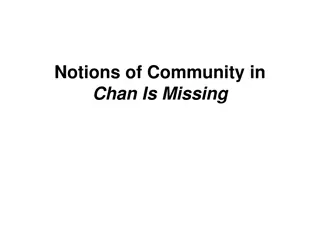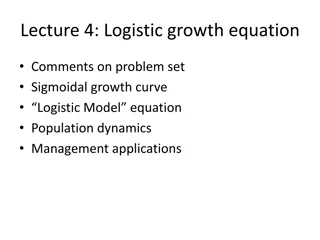Growth of South Asian Canadian Population in Canada
The population of South Asian Canadians in Canada is increasing rapidly, outpacing the overall population growth. Predominantly first-generation immigrants, they are concentrated in Ontario and British Columbia. This demographic tends to have a higher proportion of children and young adults and is slightly skewed towards males. Additionally, Max Weber's work on the religion of India sheds light on the social system influenced by the caste concept.
Uploaded on Sep 20, 2024 | 1 Views
Download Presentation

Please find below an Image/Link to download the presentation.
The content on the website is provided AS IS for your information and personal use only. It may not be sold, licensed, or shared on other websites without obtaining consent from the author.If you encounter any issues during the download, it is possible that the publisher has removed the file from their server.
You are allowed to download the files provided on this website for personal or commercial use, subject to the condition that they are used lawfully. All files are the property of their respective owners.
The content on the website is provided AS IS for your information and personal use only. It may not be sold, licensed, or shared on other websites without obtaining consent from the author.
E N D
Presentation Transcript
The number of people in Canada of South Asian origin, as defined by Statistics Canada, is growing considerably faster than the overall population. Between 1996 and 2001, for example, the number of people who reported a South Asian origin rose by 33%, while the overall population grew by only 4%
Mostly 1 generation A substantial majority of the population with South Asian origins living in Canada was born outside the country. In 2001, 68% of Canadians who reported a South Asian origin were born outside of Canada, compared to 18% of the overall population.
The large majority of the Canadian population of South Asian origin is concentrated in Ontario and British Columbia. In 2001, Ontario was home to 62% of all Canadians of South Asian origin, while another 22% lived in British Columbia.
Canadians of South Asian origin are somewhat more likely than the overall population to be children or young adults, while they are less likely to be seniors or approaching retirement age.
In contrast to the overall population, men make up a slight majority of Canadians of South Asian origin. In 2001, 50.6% of people of South Asian origin were male, compared with 49.1% of all Canadians.
Max Weber's `The Religion of India' and places it in the wider context of his work. It tries to show in detail how Weber's study of India formed part of the comparative analysis of world civilizations which was the natural result of his interest in the causal antecedents of the rise of industrial capitalism in the West
Webers thesis The Indian social system was influenced by the concept of caste (varna).[2]It directly linked religious belief and the segregation of society into status groups.
The Caste system Weber goes on to describe the caste system consist of five layers: (the Brahmins - priests), the Kshatriyas - warriors, the Vaisyas - merchants, the Sudras - laborers and the untouchables).
Power Weber pays special attention to Brahmins and considers why they occupied the highest place in Indian society for many centuries. With regard to the concept of dharma, he concludes that the Indian ethical pluralism is very different both from the universal ethic of Confucianism and Christianity.
Hinduism and Buddhism He notes that the caste system prevented the development of urban status groups Secular ethic and impact of Hindu beliefs on economy Weber discussed what influence Hinduism and Buddhism had on the mundane activities, and how they impacted the economy
Other wordly Mysticism . He noted the idea of unchanging world order consisting of the eternal cycles of rebirth, and the deprecation of mundane world.[4] By the traditionalism of the caste system supported by the religion, the economic development is slowed.. -
According to Weber - the "spirit" of the caste system worked against the development of capitalism.[5] Thecaste system promote economic and cultural stagnation a fixed social order with very little mobility
Sikhism A progressive religion well ahead of its time when it was founded over 500 years ago. Sikhs make up 1.8% of India s pop. Sikhs worldwide =-25 million. Charismatic leader-Guru Nanak
Leader-Guru Nanak He had a revelation of those who step forward as disciples, or Sikh s which literally means learners In 1499, found he had a mission to awaken people to the presence of God. He sought to teach contemporary society about socially responsible living.
The Sikh religion today has a following of over 20 million people worldwide and is ranked as the worlds 5th largest religion.
Sikhism is a monotheistic religion that originated in the 15th century in the Punjab region
The Five Ks are five Articles of Faith that Khalsa Sikhs wear at all times as commanded by the tenth Sikh Guru, Guru Gobind Singh, who so ordered it at the Vaisakhi Amrit Sanchar in 1699. The Five Ks are: 1 Keski (small turban used to cover the Kesh or uncut hair) 2 Kangha (small wooden comb), 3 Kara (steel or iron bracelet), 4 Kacchera (undergarment) and 5 Kirpan (short dagger).
The Five Ks are not just symbols, but articles of faith that collectively form the external identity and the Khalsa devotee's commitment to the Sikh rehni "Sikh way of life".
Sikhs in Canada In 1897, Queen s Jubilee celebration a Sikh regiment in parade. By 1908, 5000 had come to Vancouver. A Kalsa Diwan Society then opened in West Vancouver After that, BC gov t enacted legislation that virtually eliminated entrance .
Legislation-denied right to vote Immigrant must have a high amount of money to visit Canada. South Asian were described as yellow peril brown invasion
Komagata Maru A steamship owned by a wealthy Punjabi businessman, Gurdit Singh. The ship carried 376 immigrants from India, 351 were Sikh. The ship was denied landing rights and forced to return to Calcutta.
The Sikh immigration to Canada was almost nothing after this and many in Canada already went to the US or back to India. Little immigration prior WW2. However, some increase as a result of the 1952 Immigration Act that allowed quotas.
Point System Change immigration laws in 1967. Eliminated discrimination based upon race, religion and country of origin. Half of immigration of from India were Punjabi Sikh who could enter with semi- skilled occupations,
1970s Some anti-Asian and south Asian prejudice event particularly during economic downturns Multiculturalism first announced in 1971, helped to change attitudes. 1984 a watershed, problems in India Many young men came to Canada
Canadian Sikh then became concern for building up the economic, social and political base of the community. In the last decades of the twentieth century, the Sikh population grew by 89%.
Rituals Personal piety and devotion important The devout begin their day by meditating on the devine name Recite five liturgical prayers including the japji of Guru Nanak. Sikh can recite prayer from memory-morning and evening observances.
Social Change For first generation Sikh, rituals are without question They worry however, that 2ndand 3rd generation are becoming theologically illiterate (Scott, 326) Visits to gurdwaras, however, help young Sikh s remain in touch.
Identity An ethno religious group A religious identity and a national identity Sikhs tend to see themselves as Punjabi Sikh Canadians. Although Sikhs come from outside India such as East Africa, South Africa and the UK. Gurdwaras serve as a bulwak against assimilative pressures.
Vaisakhi (Punjabi: ) viskh), also known as Baisakhi, Vaishakhi, or Vasakhi) is a festival celebrated in the Punjab region. Vaisakhi is especially important for the Sikh community as it marks the establishment of the Khalsa.
The Khalsa is the collective body of all initiated Sikhs represented by the five beloved-ones and can be called the Guru Panth, the embodiment of the Guru and the final temporal Guru/leader of the Sikhs. The word Khalsa translates to "Sovereign/Free". Another interpretation is that of being "Pure/Genuine
More recently, this festival is also celebrated around the world by the Sikh diaspora. The festival is also celebrated by Hindus and Buddhists for different reasons including the start of the solar new year.
